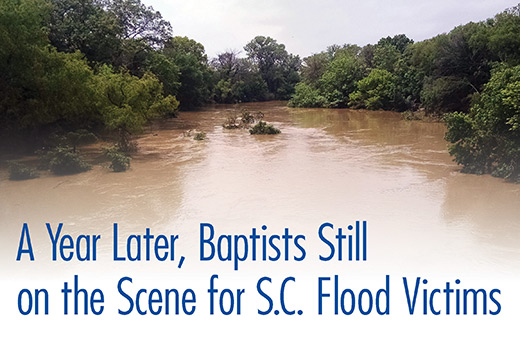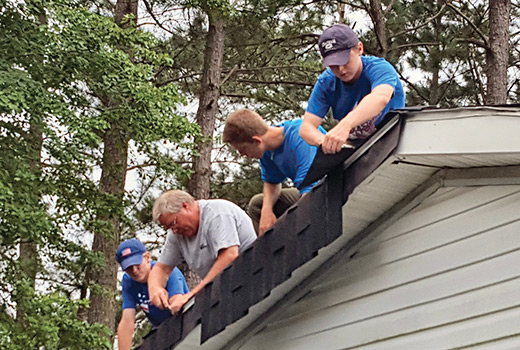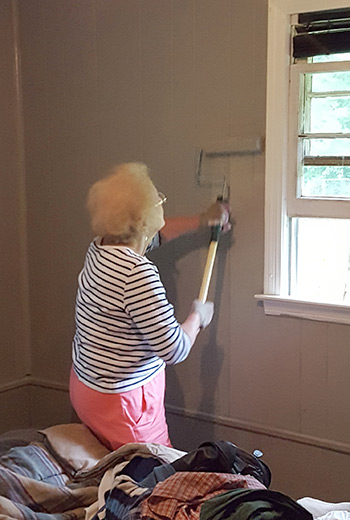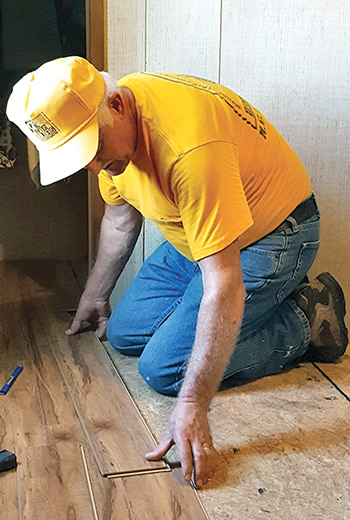Twelve months ago, when a historic “thousand-year flood” devastated lives from Columbia to the coast, Randy Creamer vowed that Baptists would be involved in the relief effort for the long haul.
“This will be a marathon, not a 100-yard dash,” Creamer, disaster relief coordinator for the South Carolina Baptist Convention, said at the time.
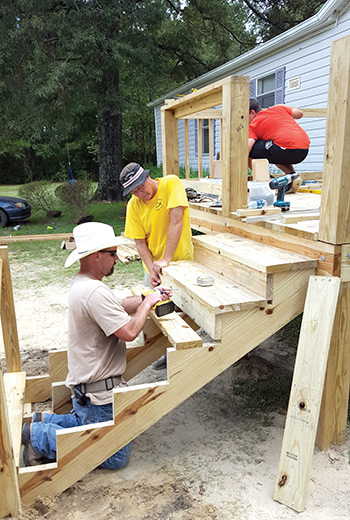
Volunteers build stairs for a new deck.
A year later, the floodwaters have receded, but left behind, alongside the mud-stained high-water marks, are people living in houses that might be deemed uninhabitable if their occupants had anywhere else to live. Because the rainfall was so heavy and unrelenting during those first few days of October 2015, thousands of roofs suffered such damage as might be expected in a severe hailstorm. Likewise, murky standing water soaked into floors, walls and insulation and left in its wake mud, mold and a lingering stench.
In the months since the disaster, and with plans to continue at least into mid-2017, Southern Baptist volunteers from within South Carolina — as well from North Carolina, Georgia and parts across the country including the Northwest — have been busy re-roofing homes, shoveling out muck, spraying mold-ridden joists and wall studs, installing sheetrock and flooring, and helping people regain a foothold in their lives.
The long-term response to assist flood victims, called “RebuildSC,” is only part of the story. In the weeks immediately following the floods, trained and certified South Carolina Baptist Disaster Relief volunteers worked in approximately 1,500 homes to remove mud and treat mold. They also provided nearly 89,000 meals and almost 5,000 showers for flood-response workers in the immediate aftermath of the floods. Disaster relief volunteers made more than 7,500 ministry contacts and recorded 92 professions of faith.
That was the first phase of the response. The second (and longer) phase, RebuildSC, has mostly involved untrained people who have mobilized within their churches to provide help in the rebuilding effort. To date, church volunteers — individuals, mission teams, youth groups, Campers on Mission, college students and senior adults — have helped rebuild 123 homes, and there are nearly 140 homes on the waiting list.
“By the grace of God, we’ve made huge strides in helping people rebuild their homes,” said Creamer, “but the flood put a laser focus on the desperate need for safe housing for a lot of South Carolina residents.” He said many of the state’s poorer residents were living in “dilapidated” houses even before the torrential rainfall highlighted the problem.
South Carolina Baptist volunteers are working alongside Baptists from neighboring states in two primary locations: Johnsonville and Georgetown. The Johnsonville effort is spearheaded by North Carolina Baptist Men and Florence (S.C.) Baptist Association, while the work in Georgetown is being coordinated by Georgetown’s Southeast Baptist Association along with volunteers from Georgia Baptist Disaster Relief.
Creamer estimates that more than 1,200 volunteers in Johnsonville and about 300 in Georgetown have been involved in the 10-month rebuilding effort.
Despite that strong response, Creamer said, more volunteers are needed to “step up” over the next several months. Churches or individuals interested in helping should contact Jack McCormick, a former contractor and commercial construction superintendent who is coordinating the RebuildSC effort. McCormick, of Anderson, is operating out of the offices of Saluda Baptist Association and can be reached at 864-225-7759 or jvmccormick@bellsouth.net.
Volunteers are needed for framing, sheetrock work, insulation, finishing, roofing, flooring, carpeting, yard cleanup and painting, among other jobs.
Creamer is quick to credit the efforts of other organizations in rebuilding homes and lives in the state — the governor’s office, the American Red Cross and Samaritan’s Purse (which will soon wrap up its work in South Carolina) — but says “the responsibility has fallen on South Carolina Baptists to make a difference” in providing “safe, sanitary and secure homes” for affected residents.
He said the rebuilding work of Southern Baptists goes beyond shingles, nails and a fresh coat of paint and extends to listening to residents, praying for them and looking for opportunities to share the Gospel. “We’re doing this with an evangelistic focus,” he said. “We’re continuing to see professions of faith, and this evangelistic effort strengthens our churches that are involved.”
“God is using South Carolina Baptists and others to restore lives and bring the hope of Jesus Christ into lives that were turned upside down,” said Creamer.
“The big things, like replacing a roof, or the little things, like adding a handicap ramp, have opened the hearts of so many to the power of the Gospel.
“The church has moved outside of the four walls and into the communities of South Carolina in a way that many have never witnessed. It’s church like they’ve never seen it.
“Residents often have a hard time comprehending these really old guys coming to help them out, or they ask why in the world would some teenage students come from the Upper Midwest to the middle of nowhere in South Carolina to build a deck at my back door. The question is always, ‘Why?’ The answer is always the same: ‘The life I live is no longer mine to live. It is Christ living in me, and I invite you to come join me in this new life with the son of God.’
“God is at work in the lives of volunteers, residents who receive assistance, vendors and suppliers, truck drivers and community leaders. And He is at work in congregations who have tasted this fresh new dimension of being on mission right in their own backyards.”
Editor’s note: In addition to helping meet the needs of flood-stricken South Carolinians over the past 12 months, South Carolina Baptist disaster relief volunteers have also responded to major flooding in other parts of the country. SCBC teams — representing churches and Baptist associations — traveled to Louisiana in the spring, to West Virginia in the summer, and back to Louisiana a few weeks ago for the most recent floods there.
